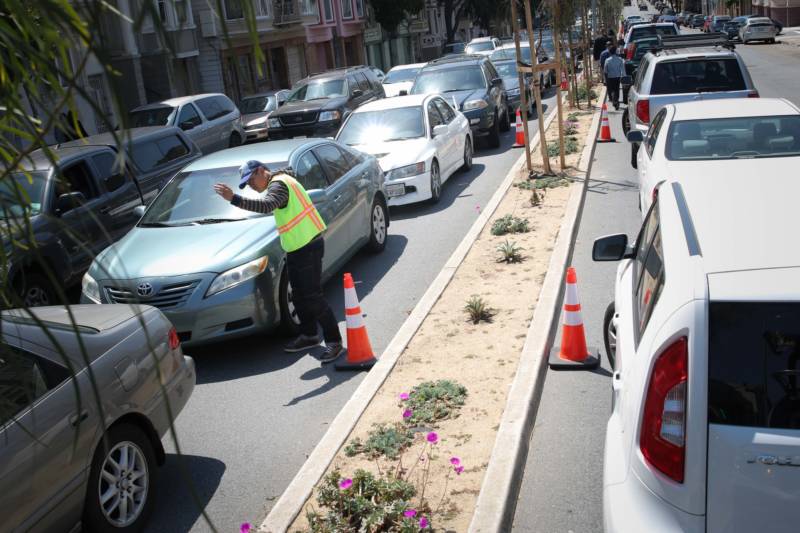But that could change if the SFMTA Board of Directors approves a staff recommendation and green lights a year-long pilot that would legalize some median parking on Dolores Street. The Board is scheduled to vote on the proposal at its meeting on Tuesday.
"It is something that the community has clearly been concerned about," said John Knox White, SFMTA's program manager.
He said much of the concern came from residents and business owners who felt like churchgoers were getting special treatment. The proposed pilot could address those issues by formalizing where and when it's legal for any car to park along the median.
Last May, the SFMTA convened the Guerrero/Dolores Median Parking Policy Advisory Committee made up of neighborhood religious leaders, business owners and residents to investigate the issue and recommend a solution to SFMTA staff. At its final meeting last February, the group voted 4-3 against any further median parking.
Elizabeth Zitrin, who was on the committee, said the committee was under the impression that its recommendation at the February meeting would be the recommendation made to the SFMTA Board of Directors. She said in an email that she will be at the meeting on Tuesday to "speak to the failure of the legitimate process and the determination of SFMTA to reach the conclusion they wanted from the beginning by completely ignoring and dismissing the opinion of the people and their own process."
Zitrin cited an online survey the SFMTA and the committee commissioned, which found that 74 percent of residents supported a full ban on median parking. In the same survey, 95 percent of worshippers said they opposed such a ban.
Knox White said the same rift was present on the committee with residents wanting to end illegal median parking while religious leaders and business owners advocating formally allowing it on weekends.
“We’ve really tried to listen to everybody in the community and come up with some sort of compromise,” Knox White said.
The SFMTA is still working on developing a recommendation for how to deal with median parking on nearby Guerrero Street. Knox White said the difficulty in producing plans for just these two streets makes it unlikely that the Dolores Street plan, if approved, would be used as a blueprint to combat median parking throughout the city.
"Every street is really unique and different," he said.
However, Knox White said the process of working with different stakeholders is a solid model that could be used on future projects.
"We have a way of bringing people together and looking at data and trying to find what I feel is a fair compromise position that really brings the majority voices of the stakeholders from all sides to a place where probably nobody is getting everything they want but everybody is getting something, and we're getting to a better place," he said.
If the Board of Directors gives the go-ahead on Tuesday, Knox White said he expects to have a final proposal for the Dolores Street pilot back before the Board within six months.

